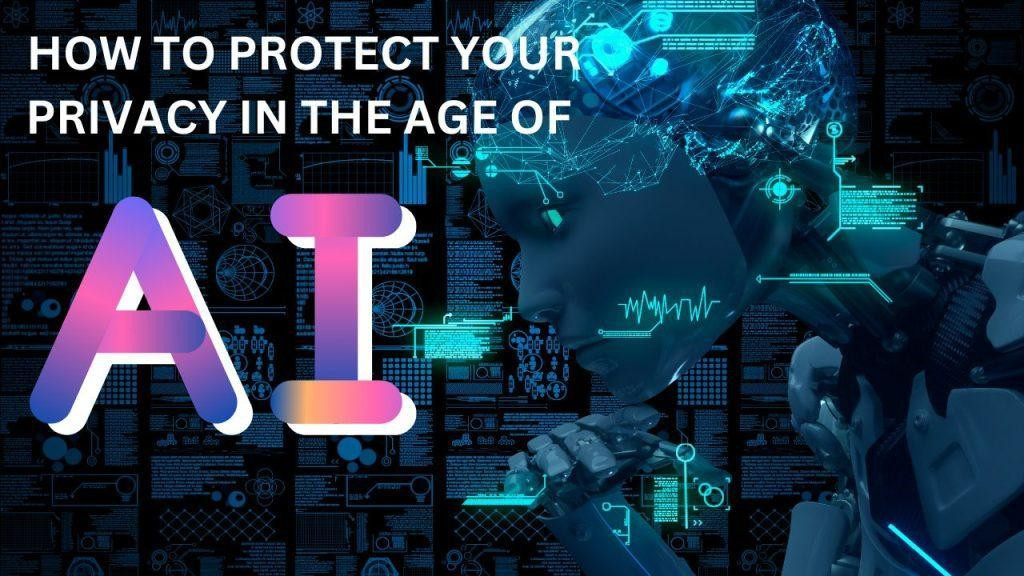6 Ways to Protect Privacy in the Age of Artificial Intelligence
(Baonghean.vn) - Artificial intelligence (AI) can pose a major threat to our security and privacy. So how can you protect your personal data from threats posed by AI?
As AI technology continues to develop and become more integrated into our daily lives, concerns are growing about how it may impact our privacy. One of the main challenges AI poses to privacy is the collection and use of personal data.
AI systems often rely on large amounts of personal data to function, which can include everything from search history and location data to financial and health information. This data can be collected and used by AI without user consent, raising questions about transparency and control of personal information.
But how can we deal with this new threat? How can we protect our privacy in an age of powerful AI algorithms that are making it easier for organizations and individuals to bypass security measures? Here are six ways to protect your privacy in the AI era.

1. Don't share sensitive data with AI chatbots
AI Chatbot is a type of artificial intelligence software designed to converse with humans in an automated manner through conversations on a chat platform. Chatbots can be programmed to answer questions, solve problems, perform simple tasks, advise on products/services, or provide information related to a specific field/provider.
AI chatbots can operate based on machine learning algorithms and natural language processing to understand and respond to user requests. The operating principle of AI chatbots is based on two core steps: analyzing user requests and sending back responses. First, it will analyze user requests to determine intent and analyze to give the most optimal response. Next, it will send the most appropriate response to users through the above analysis.
Nowadays, many people rely heavily on AI chatbots like ChatGPT to handle everyday tasks like writing emails, planning a trip, finding out about health issues, suggesting strong passwords…
While AI chatbots can make our lives easier by assisting with the above issues, they also expose us to serious privacy and security issues. For example, if you are asking ChatGPT for password suggestions, chatting with ChatGPT about your health or relationship issues, or perhaps using ChatGPT regularly to draft confidential documents for work, then your account is already a goldmine of sensitive information that threat actors can use against you.
Companies like Google, Microsoft, and OpenAI, which own the most popular AI chatbots on the market, won’t use your conversations maliciously. But hackers are different, and AI chatbot profiles, like your ChatGPT account, are prime targets for hackers. So, you shouldn’t share your personal or sensitive information with AI chatbots.
2. Be careful what you share online
Be mindful of what you share online, especially sensitive and important information. The entire AI industry is built on user data. The text you write on forums, the images you share on social media, the videos and voice notes you share are all gold mines for data scientists looking to train their AI models.
On the other hand, the current regulations governing access to data for training AI models are very loose. In fact, your data could be on a remote server halfway around the world and used to train an AI system.
Today’s AI algorithms are frighteningly powerful, and they can use the data you share online to their own private ends. So sharing too much personal information or sensitive content online increases the risk of your identity being exploited for malicious purposes.
3. Pay more attention to your online activities
AI algorithms can easily aggregate and analyze content, even private content that you don’t want to share publicly. This can create holes in your privacy, affecting your job opportunities, relationships, and online presence. If your online activities are negative, AI tools can detect this, perpetuate biases, and amplify negative information.
Of course, people still rely heavily on tools like Google to find information. However, AI chatbots are becoming a popular alternative. Soon, these AI chatbots could become a major tool for helping people find information. The data collected about your online activities today is what AI algorithms will use to inform people about you tomorrow.
4. Be as anonymous as possible
If you’ve never embraced online anonymity, now is the best time to join the trend. In the past, your privacy concerns might have been about social media apps selling your data or smartphone apps tracking you. Now, things have gotten more complicated, with powerful AI systems able to build a frighteningly accurate profile of you from the tiny bits of data you leave behind.
Companies don't necessarily buy your data from the services you use. AI tools can pick up on your digital footprint and use it to build your personality.
While fixing this problem is not easy in the age of AI, you can start by making it harder to identify yourself by being as anonymous as possible. Whenever possible, use an anonymous web browser, sign up for a virtual private network (VPN), change your username on online services, use anonymous search engines, and try disposable emails to protect your information online.
5. Use stronger passwords
Passwords are used to protect all kinds of electronic data of users, from bank accounts, social networks, websites to applications. However, many people tend to be careless, setting passwords that are easy to remember, easy to guess or duplicate between accounts. This thinking may have to change when AI-based tools take less than 1 minute to find out common passwords today.
The advent of AI-powered password cracking tools has made cracking some of the more complex passwords much easier. Take PassGAN, for example, an AI model for cracking passwords, trained on millions of real passwords pulled from leaked databases.
This AI-based “password guessing” platform successfully found 51% of common passwords in under 60 seconds, did the same for 65% in an hour, and 71% in less than a day. Over a period of a month, the program found about 81% of passwords. The study using PassGAN recorded about 15.6 million passwords that were cracked by this tool.
The difference in speed and efficiency may not be significant right now, but it's a testament to what AI can do. In addition to PassGAN, other AI-powered password cracking tools currently use different techniques to create the best password guesses.
So, to protect yourself from AI-based detection platforms like PassGAN, the first thing users should do is avoid common, easy-to-guess passwords. At the very least, create a 12-character string, using a combination of lowercase, uppercase, numbers, and special characters. A string of 12 consecutive numbers can be cracked in less than 25 seconds, but a combination of uppercase and lowercase will take 289 years to find. Adding special characters and numbers to the password string can take AI (at present) up to 30,000 years to find the result.
6. Carefully read the Privacy Policy of the websites you visit.
This is probably the most overlooked step because people think it is unnecessary. However, it is important because you will be aware of how much data the application provider is collecting from you, and have the right to refuse to use it if these terms violate your own privacy rights.
If you are going to use a service on a website and share any kind of data on it, you should take the time to read the privacy policies to understand how your data will be collected, processed and shared so that you can make informed decisions. If you find that the privacy terms or policies of the websites may expose your personal data, find a way to refuse to allow the website to use your data.
Privacy concerns in specific AI applications
As AI technology continues to advance, there are some specific applications that raise privacy concerns. One such application is virtual assistants and smart speakers, which can record and store audio data from individuals’ homes. While these devices offer convenience, the potential for unwanted data collection and misuse of personal information is a growing concern.
Facial recognition technology is another area of AI that raises privacy concerns, particularly in the context of surveillance and law enforcement. Its use can lead to the collection of biometric data without an individual’s knowledge or consent, and raises questions about the ability to maintain anonymity and privacy in public spaces.
Social media and targeted advertising also pose significant privacy risks, as the personal data collected and used to create targeted advertising can be highly personalized and difficult to opt out of. Finally, the emergence of autonomous vehicles and smart cities has raised concerns about the collection and use of location and sensor data, as well as the potential for this information to be misused or hacked.
In short, protecting our privacy in the age of artificial intelligence is becoming increasingly complex and important. As AI technology penetrates more and more areas of our lives, the challenges to security and privacy will increase. This makes it important for us to proactively take measures to protect our personal information and use AI tools responsibly to minimize potential threats in cyberspace.








